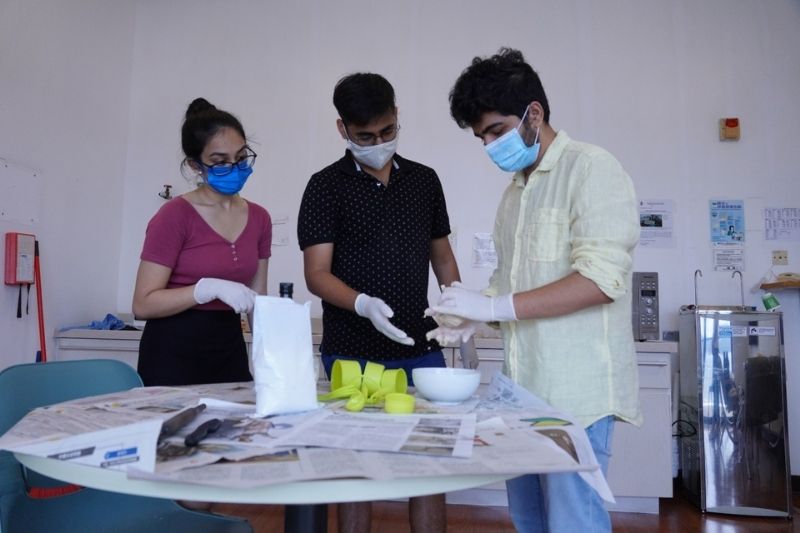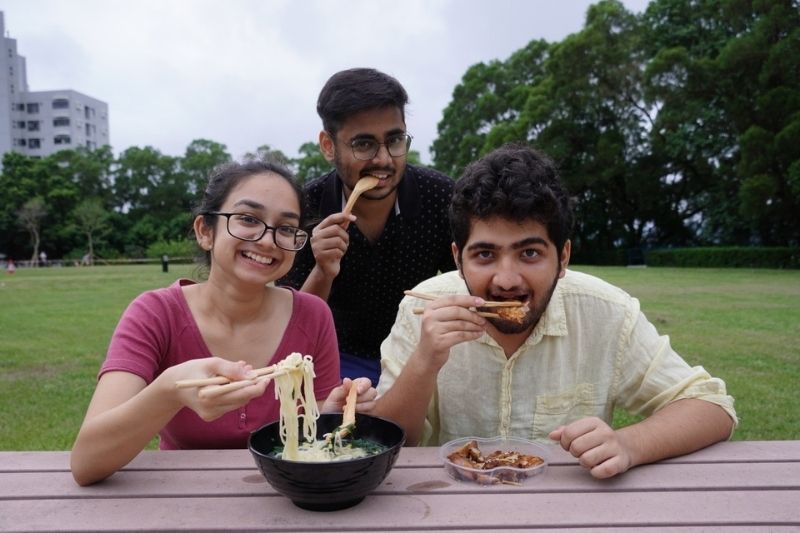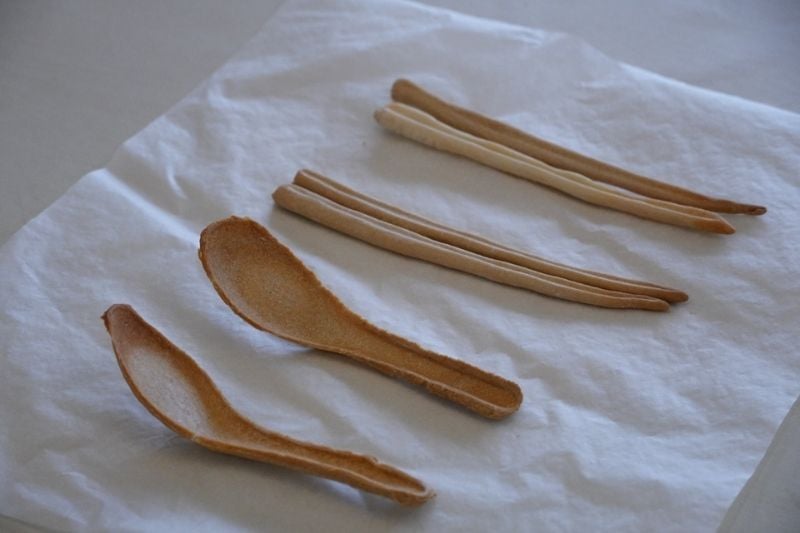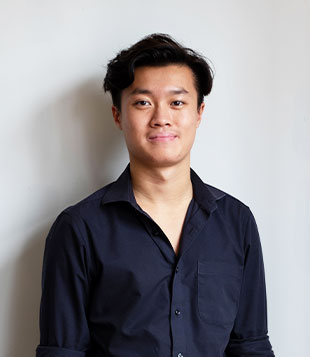What if you could eat your chopsticks while knowing you were contributing to a worthy cause? The Planeteers are here to revolutionise everything we know about modern cutlery. Introducing – edible cutlery.
Swapnil Mishra, Aditi Deodhar, Srijan Saxena and Anhad Singh Chawla are prize-winning student entrepreneurs who have invented vegan edible cutlery as a response to Hong Kong’s growing waste and pollution dilemma. HK government statistics show that about 166 tons of plastic tableware were disposed every day in 2018, and that number will surely be higher this year with the institution of COVID-19 restrictions that forced many restaurants to resort to takeaway-only. The four business students founded Planeteers earlier this year, and their ingenious creation – oven-baked, vegan, and biodegradable cutlery – earned them the Focus Area Award under the Environment and Sustainability category of the annual HKUST-Sino One Million Dollar Entrepreneurship Competition, with a prize of HKD 25,000.
See also: Crickets Could Be The Next Superfood, According to Australian Startup Hopp
All four entrepreneurs hail from India – Aditi is from Bangalore, Anhad is from Delhi, while Srijan and Swapnil both call Gurugram home. Aditi says the idea for the project was conceived in her freshman year, back when Srijan and Swapnil were still high school seniors in India. She was taking a marketing course in spring of 2019, and one particular assignment had students come up with an innovative idea for a presentation – which spawned the idea of Planeteers. “I found it interesting because it was not just an innovative solution, but it was also very sustainable, and I was personally really interested in creating an impact in society,” she recalls. But back then, as a freshman, she lacked the resources to properly pursue the idea.
The next year, after meeting Swapnil at a student society and clicking instantly, the pair decided to enter the HKUST-Sino One Million Dollar Entrepreneurship Competition with their idea – and won. “Winning motivated us to pursue this further,” Aditi said. After Swapnil recruited two more teammates, Srijan and Anhad Chawla (who was unable to participate in the interview), the Planeteers began to take shape as a real business. The “aha” moment, Aditi says, came when the team baked their first batch of actual cutlery. “I had done it by myself previously but I didn’t think it was that good. When we baked it together, I felt like this was really becoming something – I could see it, it was tangible,” she remembers fondly. Their first meal with the edible cutlery was just a simple ramen in the university cafeteria, but as Srijan states, “the very fact that our cutlery could survive under those conditions and provide a proper experience was already an achievement for us.”
See also: Slowood: The Zero Waste Store Inspiring HK to Live Sustainably
Why Sustainability Matters
The inspiration for the Planeteers came from a genuine interest in raising sustainability awareness in their adopted home, a trait that all members have in abundance. Aditi says sustainability should be about saving enough for future generations, as those of us who live in the present have a responsibility to those who are to come in the future. Despite the fact that over 4,000 tonnes of plastic cutlery gets dumped into Hong Kong’s landfills every year, Srijan believes that the sheer enormity of the number actually contributes to the problem even more. “4000 tonnes is such a big number, it’s tough for people to quantify that in their heads. In reality, the problem is very severe and it’s these little things that can change a lot,” he concedes.
“When we talk about sustainability right now, we’re asking people to sacrifice something for the planet – that’s a tough sell,” Srijan notes. It’s difficult to make people change their standard of living for a cause they might not even care about, and so sustainability entrepreneurs have to demonstrate a direct, short-term benefit. That’s one of the main goals of the Planeteers – asking people to switch to their product because it provides better value and a better meal quality. “That should be a general goal of sustainability as well – if you’re asking people to compromise, you need to offer them something worthwhile in return, so that it feels like they’re doing it both for themselves and for the environment,” Srijan points out.
Srijan believes one of the sustainability misconceptions that people in Hong Kong have is believing that their actions don’t contribute enough value; that the changes have to be on a much larger scale. “Once you start making these lifestyle changes, you’re signalling to the market that these are the changes and sacrifices you’re willing to make. Accordingly, companies will also focus on sustainability,” Srijan explains. He cites the concept of greenwashing – when companies market themselves as environmentally friendly rather than actually minimising their environmental impact – as an example of how consumers can directly impact organisations. Of course, there are companies who take tangible actions too, but the key point to note is that an individual’s actions can actually affect how the big players perceive the market.
See also: Distinctive Action: The Sustainability Star

The Sustainable Cutlery
Planeteers cutlery is 100% natural and vegan, and consists of whole grain flour and water. The texture of the cutlery somewhat resembles a breadstick, and as Aditi notes, it’s crunchy and doesn’t have a particular taste of its own, so it blends in with a meal very easily. “In terms of functionality, it’s really good to grip, and lasts really well in hot water – we’ve eaten ramen multiple times with it. It also has a long shelf life,” Swapnil adds. The team is currently experimenting with handcrafting makeshift moulds to achieve a more consistent and “conventionally appealing” shape, but it’s still “right up there with any other cutlery you might buy on the market,” Srijan asserts.
The initial learning curve was difficult, as the group had to experiment with different combinations of ingredients, temperatures, and baking times to figure out what the optimal blend would be. According to Swapnil, there was a lot of trial and error at the beginning, but the team eventually settled on a testing process in which they predetermined certain combinations they would try, which drastically increased the efficiency of the testing. “Having those predetermined combinations gave us a lot of clarity in terms of how our progress was going. In the end, we chose the best combination and we’ve been sticking to it ever since,” Swapnil explained.
The reception to the cutlery from their fellow classmates has also been quite positive. Indeed, some were impressed by the mere fact that they were able to create such a useful product. “Some of them have heard of this concept before, and they’ve seen it implemented in other countries, but to see kids who are their own classmates doing this was quite surprising for them,” Swapnil remembers. Particular praise was reserved for the functionality and durability of the cutlery, which was described as a pleasant surprise. Many did not think the cutlery would survive hot water and soups, but the group discovered how to use a natural, plant-based gum in their baking process to make their product stronger and more cohesive.
A key business model difference between the Planeteers’ and their competitors, as Swapnil explains, is that other edible cutlery manufacturers are trying to manufacture cutlery on their own, which does not give them the benefit of scale. The Planeteers, however, are attempting to work with excess bread produced by local bakeries – a cost-saving manoeuvre that could make a huge impact. “According to our model, we get to leverage the scale that existing bakeries have and use their resources at a much lower cost, and so our gross revenue is way higher in terms of the projections that we’ve made,” Swapnil estimates. The group has lofty ambitions, and it’s exciting to imagine what their place in the edible cutlery industry could look like in a few years time. “In the future, we want to completely replace plastic disposable cutlery,” Aditi confidently states.
See also: Happy Earth Farm: The Thai Farm Making Edible Organic Body Products

The Future of Planeteers
“This is a really exciting time for us, because we’re talking to a lot of people from the food industry – chefs, food experts, and bakeries,” Aditi reveals. The group is currently engaged in discussions with several interested parties to figure out what individual wants and expectations are. “Again, these are early stage conversations, but it’s been very promising,” she says. The Planeteers want potential partners to be involved as stakeholders in the product’s development, Srijan says. “We don’t want to think from our side alone; we want to know what our consumers like, what the best processes are, and what the best and cheapest ingredients that the bakeries can use to create this product are.” An official pilot is also in the works.
But the trial and error process isn’t over. The group is well aware that their product is still in an early stage of development, and know that there’s a lot more experimenting to carry out before they can be truly satisfied with their product. “Yes, this is the best recipe we’ve come up with so far, but there’s a lot of other ingredients that we’re going to be testing to make sure that this is as close as possible to actual cutlery, but also edible and tasty at the same time,” Srijan emphasizes.
As the Planeteers’ business model is mainly business to business, the group does not have to deal with conventional marketing to consumers. “Instead, our plan is to actually directly partner with restaurants and have sustainable weekly orders going, and that requires a different kind of marketing – word of mouth,” Srijan explains. He says there are already a couple of restaurants that are interested in trying their product for a few weeks or months to see how it holds up in terms of cost and demand. In terms of marketing, the group is specifically targeting restaurants that already have a vision of sustainability – as they’ll be much more eager to adopt edible cutlery. They’ll also be more willing to pay a slightly extra cost if they’re already using other kinds of sustainable alternatives.
See also: Meet the Singaporean App Helping You Track Your Carbon Footprint
Looking Ahead
Hong Kong, being a city with one of the highest number of restaurants per capita in the world, is an ideal place for the Planeteers to launch their full product, once completed. In the long run, however, Aditi sees expansion as a potential option for the group – with India and Mainland China currently being considered as possibilities. “In the long term, overseeing a large societal impact is something that’s really important to us,” Aditi reiterates.
The end goal, as Swapnil explains, is to add and create as much value as possible – by making changes such as multiple flavour options and moving from bakeries to mass manufacturing. With the rapid progress they’ve made in the past few months, it’s clear that the Planeteers aren’t here to just be in the background as an alternative to plastic cutlery. “We want to be perceived as something which is part of the meal, uplifting the taste, and enhancing the culinary experience. Anything which furthers that interest is something we will be keen on pursuing,” Swapnil concludes.
See also: Meet the Thai Engineer Who Upcycled 100,000 Flip Flops from Ocean Debris






